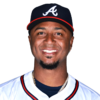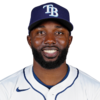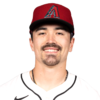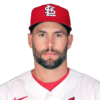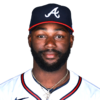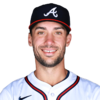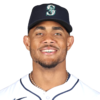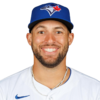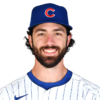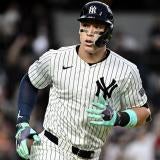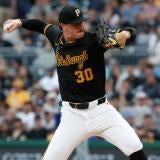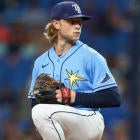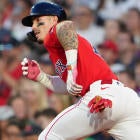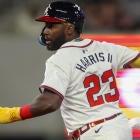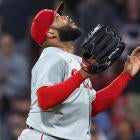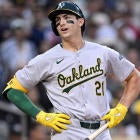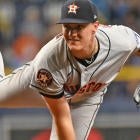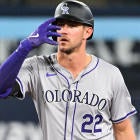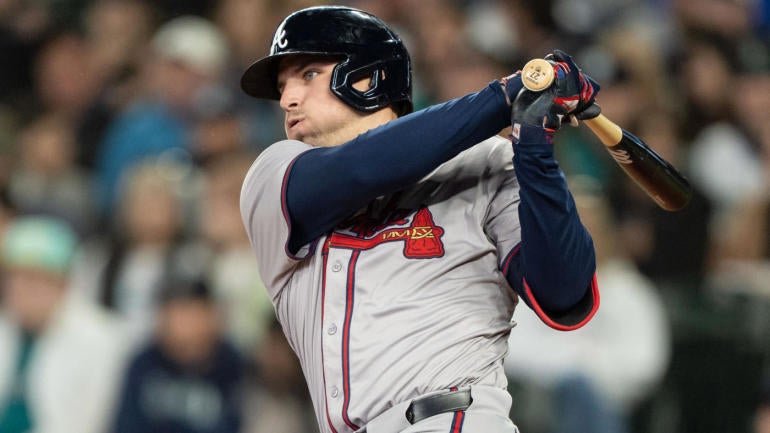
I know you're tired of hearing it'll all be fine, but the truth is I don't know what else to say.
Back in late April, I wrote about how you shouldn't reexamine your views on any high draft pick until about mid-May. The "six-week rule," I called it.
The article was sort of boilerplate, the kind I write at the start of every season to preempt mass freakouts over small-sample weirdness. But now, we're nearly 12 weeks into this season. It's roughly 40 percent over, and that small-sample weirdness has given way to not-so-small-sample weirdness.
That's especially true for hitters, who have suffered from an unexpectedly oppressive offensive environment. It became clear something was amiss at about that six-week mark, and it's shown no signs of letting up since then. You can measure this in a number of ways, but I like to use BABIP (how often a batted ball becomes a hit) and HR/FB rate (how often a fly ball becomes a home run). And well, this table pretty much sums up what's happening:
| | BABIP | HR/FB |
2015 | .299 | 11.4% |
2016 | .300 | 12.8% |
2017 | .300 | 13.7% |
2018 | .296 | 12.7% |
2019 | .298 | 15.3% |
2020 | .292 | 14.8% |
2021 | .292 | 13.6% |
2022 | .290 | 11.4% |
2023 | .297 | 12.7% |
2024 | .288 | 10.8% |
As you can see, 2024 is shaping up to be the worst year for offense in at least a decade. It's not totally fair to compare full-season numbers to partial-season numbers given that July and August tend to be the best months for offense, but even comparing June to June, 2024 is pacing behind 2022, which had been regarded as the "dead-ball year," at least by recent standards.
Given the environmental conditions, there are many hitters underperforming, to varying degrees. Here, I'd like to focus on what I believe to be the 15 most egregious cases
What struck me when I dug into the numbers is how nothing appears to be that wrong for any of them, which would normally mean ... it'll all be fine. It's why, even now, I'm reluctant to change my stance on any of these players, believing that if I just wait long enough, the numbers are sure to normalize. But the way the ball has played this year makes nothing seem so certain anymore. There comes a point where you have to ask if certain hitters aren't as good anymore, whether because of the environment or something else.
For each of these 15, I've denoted my level of concern by the number of red flag indicators 🚩, with one being the lowest concern level and four being the highest.
Concern level: 🚩🚩
Much under the hood looks normal for Ozzie Albies. He's barreling up fewer balls, which has been a common theme among Braves hitters, but considering his exit velocities are in line with career norms, it would suggest more of a timing issue than a loss of skill. Then again, those exit velocities have always been on the blue side of the Statcast ledger, and you may have heard that the ball isn't carrying as well this year. Might it have effectively nerfed Albies' power? Well, our closest comparison is 2022, when Albies delivered an unimpressive .247/.294/.409 slash line in 64 games. A couple of lengthy injury absences may have polluted those results, but the fact is we were asking similar questions about Albies' power outage back then.
Concern level: 🚩🚩🚩1/2
Nolan Arenado has always been an unconventional slugger in that he relies more on high pull rates than high exit velocities for his power, but he's really pushing the limits of that approach this year. His average exit velocity ranks in the 8th percentile and his max in the 37th percentile, which is no doubt only exacerbating the issue of the ball not carrying as well this year. Seeing as he's 33 years old, we can't rule out the possibility of diminished skill here, but even if the exit velocities bounce back, I'm not sure the impact will be anything to write home about. Arenado hit .266 with 26 homers and a .774 OPS last year, when offense wasn't so greatly suppressed. He might be no better than a third base version of Lourdes Gurriel.
Concern level: 🚩🚩🚩
What's especially concerning about Arozarena's struggles is that they date back to the second half of last season. Over the past 365 days, he's slashing .210/.318/.358, albeit with 19 home runs and 20 stolen bases. There are some indications that he's pressing, which wouldn't be altogether surprising given how long he has struggled. His strikeout rate (27 percent) is at a three-year high, and his fly-ball rate (44 percent) is at an all-time high, which can be a good thing but can also be bad if it's resulting in more outs on contact. Most concerning, though, is that he's gone from hitting .306 against fastballs in his first four seasons to hitting .257 against them last year to hitting .143 against them this year.
Concern level: 🚩🚩1/2
There may be some confirmation bias at play here given that I was already skeptical of Bo Bichette making much of an impact as a slugger this year. His pull percentages have been steadily declining, and this year has only continued the trend. What I didn't anticipate was his barrel rate being cut in half. He's striking out less than ever but is perhaps selling out too hard for contact, compromising his potential to inflict damage. Ironically, batting average seemed like the safest part of his profile coming in, but these changes have only served to undermine it. There's still a good player in there with plenty of career left to sort it all out at age 26, but it's reasonable to wonder how high-end the outcomes will be this year.
Concern level: 🚩🚩🚩1/2
Corbin Carroll has hit a ball as hard as 111.5 mph this year, giving him an 82nd percentile max exit velocity compared to 89th percentile last year, so the raw strength is still in there. But on average, the quality of contact is way down from his rookie season (19th percentile average exit velocity vs. 63rd percentile). Many have blamed the pair of scary shoulder episodes that happened in the middle of last season, which is a reasonable enough theory in the absence of any other, but Carroll's average exit velocity from the second of those episodes to the end of the season was 89.1 mph, which is much better than the 87.0 mark we're seeing now. Everything else from the plate discipline to the spray angle looks good, so there are no other prevailing theories. What makes the Carroll situation so frustrating is that if there's any smidgen of hope he could come around, you have to stick with him. There's no easy way to replace a first round-caliber bat, not in this hitting-starved environment, but you'll almost feel like you won the lottery if it happens at this point.
Concern level: 🚩🚩
You might say my concerns for Nick Castellanos coming into the season have been realized, but those concerns were mostly rooted in his career-worst 28 percent strikeout rate last year. It's down to a more typical 22 percent now, and in a way that hasn't undermined his contact quality. In fact, he's actually delivered his hardest-hit ball since Statcast began measuring such things, not only topping 112 mph for the first time but also 113 mph. His launch angle and pull rates are normal. His barrel rate is down, but not as low as in 2022, when he still batted .263. It all suggests Castellanos' struggles this year may be as simple as bad BABIP luck. His BABIP was over .325 the past three seasons, but it's only .243 now.
Concern level: 🚩🚩🚩🚩
Paul Goldschmidt's average exit velocity is OK, but the rest of his Statcast page is trending more toward blue than red. For as bad as his strikeout rate seemed to be in 2nd half last year, when hit .246, it was only 26 percent. It's up to 29 percent now, far and away a career worst. I worry that the 36-year-old has gotten, well, old, with the clearest indication being his struggles against fastballs. They're supposed to be the easiest pitch to hit, unless a hitter just can't catch up to them. According to FanGraphs, Goldschmidt's 10.4 percent swinging-strike rate against them last year was his worst since his rookie season. Sounds bad, right? Well, it's, um ... 14.4 percent now.
Concern level: 🚩🚩
Michael Harris' slash line as a sophomore last year (.293/.331/.477) was nearly identical to that of his rookie season (.297/.339/.514), but you should know that he didn't take a straight line there. On this same date last year, he was slashing .188/.266/.297. Of course, that was in about 20 fewer games than he's played now, but maybe it's the warm air that's the determining factor rather than the sample size. Harris isn't without blame in this. He's putting the ball on the ground far more than last year (though less than in his rookie season). His barrel rate is down and his strikeout rate slightly up. Then again, he has also delivered the hardest-hit ball of his career (114.4 mph). Seems to me more of a timing issue than a skill issue, all things considered, but even so, can we count on him to get as hot as he did last summer?
Concern level: 🚩🚩1/2
Looking over the data for Manny Machado, not a whole lot stands out. You'd be correct in saying he has a career-worst strikeout rate, but at 21.2 percent, it isn't exactly high and isn't some great departure from his 20.7 percent mark in 2022, when he put up a .298-32-102-100-9 line. In fact, all of Machado's underlying numbers are similar to that season, which also happened to be when the ball was as deadened as it appears to be now. So the biggest concerns for Machado would seem to be health-related. He hurried back from offseason elbow surgery, being limited to DH at the start of the year, but you'd think any lingering effects would show up in the Statcast data as well as the forward-facing numbers. He's also attempting to play through a strained hip flexor, but that's a more recent development.
Concern level: 🚩1/2
Could Matt Olson get back to being the 54-homer monstrosity he was a year ago? It's still within his capabilities, but if we're willing to set our sights a little lower than the absolute best-case outcome, I'd say the chances are high of him delivering on it. The strikeout rate is up a bit, but not totally unprecedented for him at 26 percent. The exit velocity readings are down a touch, but still in the top 10 percent of league. His .251 xBA and .461 xSLG are very similar to his .248 and .467 marks from two seasons ago, which wasn't his best, but he still wound up hitting 34 homers as compared to the 23 he's on pace for now.
Concern level: 🚩
Austin Riley might be the most surefire bounce-back bet of anyone on this list. His strikeout rate, walk rate, hard-hit rate and average launch angle are all normal. You could say his exit velocity readings are down a shade, but they're basically in line with his 2021 season, when he first broke through as a Fantasy stud. What's mainly off kilter is his barrel rate, which isn't bad at 10 percent but is normally more like 13-14 percent. It would suggest he's not squaring up the ball as consistently, but once he gets locked in, he could do serious damage over a short span of time.
Concern level: 🚩
Julio Rodriguez had a .254 xBA and .460 xSLG in 2022 and a .274 xBA and .475 xSLG in 2023, both great years that got him drafted in the first round the following year. This year, he has a .272 xBA and .426 xSLG, which ... seems basically in line? The barrel rate is down a bit and the strikeout rate up a bit, but nothing that would suggest he's a fundamentally changed player who's broken beyond all repair. He may be a little too focused on spraying the ball to all fields, judging by the career-low pull rate, and that combined with the league-wide power outage has cut his home run-to-fly ball rate from 20 percent to 9 percent. Still, if anyone stands to improve from the ball carrying better as the air gets more hot and humid, it's Rodriguez.
Concern level: 🚩🚩🚩
George Springer's high-end exit velocities have always been better than Nolan Arenado's, but he's similar in that his average exit velocity was never as high as you'd expect for a player with his power production. It's totally in the tank this year, though, ranking in the 7th percentile. You might presume it's a product of his 34 years of age -- and perhaps it is -- but notably, his 14.6 percent strikeout rate is a career low and his 37.7 percent pull rate is his lowest in 10 years. The Blue Jays have long put an emphasis on bat control and hitting the ball to all fields (to their detriment, in my humble opinion), and it's possible that Springer has bought in. Or maybe it's just that he's putting the ball on the ground way too much (53.6 percent). In any case, the number of changes to his hitting profile suggest no easy fix.
Concern level: 🚩🚩🚩
What stands out most for Swanson among this group is that his 11 percent barrel rate is actually quite good and rather in line with career norms. You could call that good news, but it would suggest his issues are more foundational than just not having his timing right. And indeed, his 28 percent strikeout rate and 52 percent ground-ball rate are both career highs, the latter substantially so. And, uh-oh, his batting average is especially bad on four-seam fastballs (.179), which might suggest some age-related decline (though he's at least making contact against them, unlike Paul Goldschmidt). I've seen Swanson dropped in a couple leagues already, and he does have a narrower margin for error given that his best is only mid-tier at a position that has generally pulled its weight this year. I'd continue to trust in the track record in leagues that require a third middle infielder.
Concern level: 🚩🚩🚩
I don't mean to be an alarmist, but the truth is everything looks pretty bad for Gleyber Torres. His strikeout rate is his worst since his rookie season. His exit velocity readings aren't totally out of character but are his worst in three years. He's popping up at nearly double last year's rate and pulling the ball less than ever. I'm inclined to give him the benefit of the doubt because he's 27 and in one of the best lineups in baseball, but even at his best, it's not like he was an out-and-out stud in Fantasy, averaging about as many Head-to-Head points per game last year as Luis Arraez. Compared to some on this list, it'll be harder to wait out Torres in shallower leagues.







